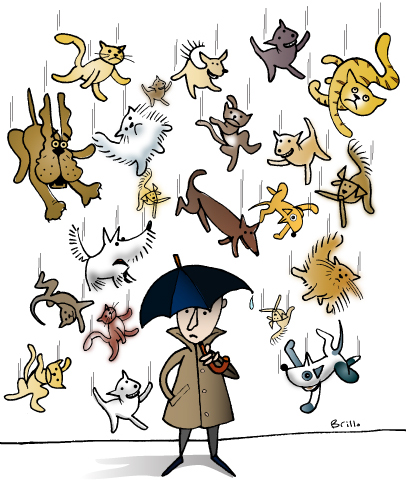The Idiot’s Guide to English Idioms
Table of Contents
 There are many phrases and idioms we bandy about in every day conversation, but have you ever wondered how they came to be in common parlance?
There are many phrases and idioms we bandy about in every day conversation, but have you ever wondered how they came to be in common parlance?
Some are as you imagine, some are not, so here are a few examples as a case in point.
Case In Point
Derived from the Anglo-Norman French term en point and became in point meaning to be pertinent. It then became common in legal terminology, hence the case reference.
Mum’s The Word
This has nothing to do with mums, although the phrase meaning to keep quiet is something they probably say often! It actually refers to a sound made while keeping your mouth shut, such as mmmm or humming, and the word miming has also come from this 14th century word.
The Hair Of The Dog
This is a saying that seems to have derived from apothecary circles that prescribed eating the hairs of the dog that bit you to avoid worse consequences. It was applied as a cure for hangovers around the 16th century with Shakespeare making it a common phrase. Funnily enough a similar idiom is used in Hungary, and Mexico, and in Costa Rica the same phrase is used, but with a pig replacing the dog as the central character.
Having Your Guts For Garters
The serious consequences of "having your guts for garters" does appear to be quite a literal threat with many references to it in historical documents. The earliest known example occurred in Robert Greene's The Scottish Historie of James the Fourth, in the late 16th century: “Ile make garters of thy guttes, Thou villaine.”
Raining Cats And Dogs
Unfortunately, we often say it’s "raining cats and dogs" in the UK, but the origin of the phrase appears to have come about in the 17th century when heavy rain would result in dead animals on the roofs being washed onto the street – let’s be thankful we just have to deal with a bit of rain these days!
Mad As A Hatter
"Mad as a hatter" is a rare thing, an idiom with its foundations endorsed by science. The use of mercury was regularly used to make hats in the 19th century, and the constant exposure eventually gave the hat-makers mercury poisoning, symptoms of which included shaking, aggressive behaviour, and anti-social tendencies, hence the term coming to fruition.
Saved By The Bell
My favourite is "saved by the bell", and although there are many theories related to boxing bouts, I’m going with the popular notion that people were rescued from being buried alive in ye olden days by having a string attached to a bell outside of the coffin, in the more-often-than-we-care-to-imagine case of them being mistaken for dead. In fact, Frederic Chopin’s famous last words were "Swear to make them cut me open, so that I won't be buried alive."
There are hundreds of phrases we use every day, and of course, Shakespeare was responsible for many of them: much ado about nothing; all that glitters is not gold; too much of a good thing; wear your heart on your sleeve; rhyme nor reason; in a pickle; green-eyed monster; hearts content – in fact the list goes on. Different cultures have different phrases with different origins, what are your favourites?


